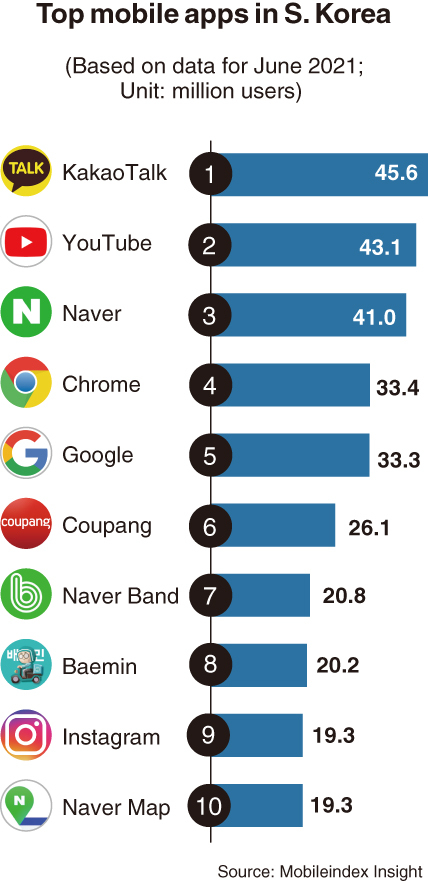The top three mobile apps in South Korea -- KakaoTalk, YouTube and Naver -- attracted over 40 million users each in June this year, accounting for the bulk of the country’s population of 52 million, according to data compiled by research firm Mobileindex Insight.
The list of popular apps also includes Chrome, a web browser from global search engine Google, Korea’s top online retailer Coupang and popular photo-based social media Instagram, a unit of Facebook.
The common thread connecting these apps is that they collect a myriad of user data via apps, websites and payment records and accumulate massive volumes of diverse data sets, known as “big data.”
The companies then analyze big data to identify new patterns, trends and relations involving users’ behavioral patterns and preferences. The results are often used to produce intricately targeted ads on social media and the web, as demonstrated by the huge amount of ad revenue Google’s parent company Alphabet and social media giant Facebook earn each year.
In recent years, not only foreign tech giants, but also a growing number of Korean companies in a wide range of fields are using big data to generate greater revenue and chart a new course in their business strategy.
For instance, NH NongHyup Life Insurance said Monday it would expand the use of big data analysis based on the data platform it built up last year. The company said its big data analysis would focus on developing new forecast models for its insurance policy products and marketing tools tailored for customers.
“The company set up a big data analysis platform in the second half of last year, which offers analysis environments and open-source tools for data analysts,” the company said. “We will provide more training programs for those who want to become data analysts in order to work on more professional topics.”
Insurance companies in Korea often piece together big data and machine learning to craft various insurance forecast models, including how long customers will maintain their contracts and whether they will buy additional policies.
Telecom operators are also keen to utilize their big data sets. KT, SK Telecom and LG U+ dominate the local telecom market, an ideal position for collecting and analyzing big data coming from Korean subscribers, including increasingly important mobile data usage and related details.
With the revenue growth from fixed-line and mobile telecom services lackluster, the three telecom heavyweights are scrambling to diversify revenue sources, one of which is to use big data to create more sophisticated non-telecom services.
KT said it was teaming up with the Korea Financial Telecommunications & Clearings Institute, which runs mobile payment called Zero Pay, to provide small and medium-sized merchants a big data service that includes artificial intelligence solutions.
Under the partnership, small restaurants and retail shops can use Zero Pay equipped with KT’s big data analysis tool that shows district-based data including foot traffic.
KT plans to upgrade big data and related services for Zero Pay as part of its digital transformation support program for small business owners, according to KT’s convergence division.
LG U+, a telecom unit of LG Group, was recently designated as one of the key companies that would join the “data dam” project aimed at setting up big data centers in cooperation with the Ministry of Science and ICT and NIA, or the National Information Society Agency.
The data dam project is designed to build big data centers in 16 categories ranging from finance to retail to health.
Under the state-run project, LG U+ would handle the health sector called “life log” together with Yonsei University to collect, analyze and manage data related to health and telecom services.
LG U+ said it would provide data on hourly foot traffic data, telephone call volume, viewing time for its IPTV and mobile TV services. The newly created big data will be made available for users of the life log platform, the company said.
“We will actively help small and medium-sized companies as well as startups to utilize the big data to offer more value to their customers,” said Park Jong-wook, chief strategy officer of LG U+. “Instead of a one-off program, we will create a system to secure data in the long run, drawing up new business models with health service providers.”
LG U+ is also working with NICE Information Service, which provides credit ratings and personal credit information, to use big data for its sister company’s home appliance rental service.
On Tuesday, LG U+ said its credit rating model, based on its own telecom big data and NICE Information Service’s credit data, would be used for LG Electronics’ home appliance rental service. The new big data model is to help those with insufficient credit records, such as college students, rent out home appliances, incorporating their telecom payment data into the total credit score.
“The proliferation of contactless services during the COVID-19 pandemic and the popularity of subscription services are contributing to the wider use of telecom data in the credit rating market,” said Kim Hyung-chan, head of future business division at NICE Information Service.
Korea’s government agencies, which collect and manage a massive amount of data on citizens, are taking the lead in the use of big data to launch new policies. For instance, the Seoul Metropolitan Government said Tuesday it had analyzed around 630,000 cases related to unfair deals that were mentioned in the local media and on social media between 2019 and 2020. Based on the big data analysis, it would implement a field survey while coming up with support programs for those who suffer unfair trades.
According to the city of Seoul’s analysis, the culture and arts category witnessed the most unfair transactions, such as copyright theft. Online platform companies were also cited as a sector fraught with unfair contracts, especially concerning their monopolistic practices.
“We have identified the real issues impacting citizens as a result of big data analysis,” said Han Young-hee, an official from the city. “Starting from the culture and arts sector, the city will try to help out the companies that faced unfair contracts and come up with proactive countermeasures.”
The global big data platform market, valued at $41.15 billion in 2018, is forecast to grow at a compound annual growth rate of 11.2 percent to $86.6 billion by the end of 2025, according to QYResearch.
The Korean big data platform market, meanwhile, stood at 190.7 billion won ($165 million) in 2018 and is predicted to reach 375.7 billion won in 2025, according to data compiled by the Ministry of Science and ICT.
By Yang Sung-jin (
insight@heraldcorp.com)









![[Today’s K-pop] Blackpink’s Jennie, Lisa invited to Coachella as solo acts](http://res.heraldm.com/phpwas/restmb_idxmake.php?idx=644&simg=/content/image/2024/11/21/20241121050099_0.jpg)